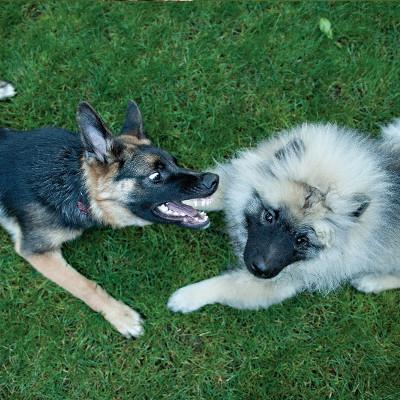 Do you have a pure-breed or mixed-breed dog? Is a pure or mixed-breed pooch most appropriate for your lifestyle and dog-owning desires? Some owners prefer the pure-bred dog while others gravitate toward a potentially unknown mix of breeds. Such is truly a personal preference. Regardless of your pet’s pure-breeding or mongrel status, all dogs should be treated with the same degree of love, socialization, and pursuit of veterinary care.
Do you have a pure-breed or mixed-breed dog? Is a pure or mixed-breed pooch most appropriate for your lifestyle and dog-owning desires? Some owners prefer the pure-bred dog while others gravitate toward a potentially unknown mix of breeds. Such is truly a personal preference. Regardless of your pet’s pure-breeding or mongrel status, all dogs should be treated with the same degree of love, socialization, and pursuit of veterinary care.
Instead of deciding that one breed is right for you based on the dog’s physical appearance, I suggest future owners create a checklist determining a variety of characteristics about their potential canine companion before going about selecting a pure or mixed breed pooch.
Size
The size of dog you choose will greatly influenced a variety of factors in your day to day life. Although there is no specific guideline as to what weight makes a dog small versus large, here is the approximate criterion I’ve created for my clients and readers:
- Extra Small- 0-5 pounds
- Small- 5 to 20 pounds
- Medium- 20 to 50 pounds
- Large- 50-80 pounds
- Giant- 80 plus pounds
Having an extra-small or small dog may appeal to your sensibilities if you want your pooch to accompany you on your daily errands. These more-petit pooches dogs can easily be picked up in one arm and readily nest inside an over-the-shoulder carrier while out and about.
Smaller dogs take up less space in a room, can more easily get underfoot, and may cause you to trip and fall or even crush them under your weight. Additionally, smaller pooches may not be able to endure exercise like running or hiking with their human caretakers or hold their own at parks and other canine-socialization areas as well as medium to larger dogs.
Extra small and small dogs generally live longer, but are more prone than their larger counterparts to ailments like periodontal disease and endocrine abnormalities (Cushing’s disease, diabetes, etc.).
Medium dogs tend to be universally appropriate in their size and weight to be able to acclimate to a variety of household circumstances and often can readily go with their owners. Midsize dogs aren't as easily scooped up for safety purposes and likely won't fit into the confines of a carrier for in-the-cabin airline travel. As a result, medium and large canines are placed in the cargo hold of an airplane away from the immediate observation of their owners.
Large and giant dogs make their presence known due to their impressive proportions, which reduces the likelihood an owner will trip over their pooch but makes sharing a household space more challenging. Additionally, when larger canines are less mobile due to injury or illness, then the burden falls to the owner to provide lift and support in all parts of their dogs’lives including urinating and defecating multiple times per day.
Larger dogs typically live shorter lives than their smaller counterpart in part due to their propensity for painful conditions that negatively affect their movement, daily comfort, and quality of life such as osteoarthritis, traumatic joint injuries (cruciate ligament tear, etc.), and cancer of their musculoskeletal structures (bone, cartilage, etc.).
Bigger dogs also are more expensive to feed and medicate as of their larger size requires a higher number of daily calories and greater concentration of medications. Therefore, thoughtfully evaluating the size of dog that works best for your lifestyle is a crucial consideration when selecting a pure or mixed breed pooch.
Coat: Shedding versus non-shedding
Shedding dogs may be desirable due to their general lack of need for frequent bathing and coat care. Yet, dogs that shed tend to be more associated with human allergies, as dander (skin cells) and hair are sloughed off in more frequently and in larger quantity.
Non-shedding dogs need regular and often frequent grooming to prevent hair matting, stinky coats, and skin lesions (hot spots, etc.) which requires effort or expense on their owners’ behalf to manage. Dogs who don't shed still lose some hair and skin, but they can be considered hypoallergenic (less allergy-inducing) as they do so less frequently and in smaller quantities. Since environmental allergens tend to accumulate more on non-shedding dogs, humans can still have an allergic response if their pooch has been mopping up seasonal or non-seasonal dust and dirt on his coat before snuggling up.
Coat: Short versus long-haired
Shedding dogs may have short or long hair, depending on the breed or mix. Longer-haired dogs, despite their shedding or non-shedding status, typically require more effort and expense on behalf of the owner to maintain a healthy coat. Non-shedding dogs have variable hair lengths depending on the owner’s decision to cut the coat short or to let it grow out. Considerations the implications of your future dog’s coat is important as the decision will directly affect household cleanness and affect the quality of life the humans also sharing the space.
Activity Level
Some dogs spend all day lounging away on the couch while others require what seems like constant exercise. A dog’s needs for activity, socialization, and household and yard space, must all be considered when selecting the appropriate canine companion for your lifestyle.
If you live in a shoebox apartment in a dense urban setting, then acquiring a high-energy dog needing frequent exercise and behavioral stimulation like a herding (Border Collie, Australian Shepherd or Cattle Dog, etc.) or sporting (Weimaraner, Viszla, etc.) breed or mix may not be the best choice. Alternatively, if you’re a suburban or rural dweller having a sizable, fenced-in yard, then having a high-energy breed or mix may just work out or your dogs needs and your desires as an owner.
Breed-Specific Health Problems
There are known health conditions associated with different dog breeds. As generation after generation of dogs go into the overall health-make up of a particular breed, the trend for health problems to emerge during puppy, adult, or geriatric years becomes evident. If you were to Google a “health concerns associated with ______ (insert breed here)”, you’ll find numerous websites listing a vast array of ailments potentially affecting pooches having such pedigrees.
The size-related elements mentioned above can translate onto nearly any purebred dog. For example, the Chihuahua, Maltese, and Yorkshire Terrier (Yorkie) are well known for their problems with periodontal disease. In veterinary medicine, we even have a term of less-than endearment for the commonality of severe periodontal disease seen in the Yorkshire Terrier: “Yorkie mouth.”
Alternatively, the Golden and Labrador Retriever, Great Dane, Mastiff, Rottweiler and other large and giant breeds are very prone to mobility compromising conditions like osteoarthritis and often fatal diseases like gastric dilatation volvulus (GDV or “bloat”), hemangiosarcoma (malignant cancer of the blood vessels commonly affecting the spleen and liver), and osteosarcoma (malignant cancer of the bone).
If you are interested in getting a purebred dog, it's important to become familiar with the potential diseases your pooch may face simple due to his genetics before you actively pursue getting a specific breed. The AKC’s Canine Health Foundation (CHF) has great Disease Information and Breed Specific Health Concerns pages covering a vast array of conditions. The CHF is striving to promote the best health of pure breed dogs (and therefore all “dog-kind”) by educating canine aficionados about the availability of Genetic Tests that can be determine if a particular dog is a carrier of a gene that may ultimately lead to disease or permit be health problems to be passed on to future generations (i.e. such dogs shouldn’t be bred).
In general, mixed breed dogs are perceived to be healthier than their pure-bred counterparts. Mongrels are also prone to the above and other conditions, but the fact that they are typically bred without specific intention (i.e accidental breedings) nor for their outward physical appearance often reduces the likelihood breed-specific ailments will occur. So, take the above information into consideration before you go the route of getting a pure or mixed-breed pooch. Doing so can help to ensure you gifts a dog that is best suited for your lifestyle, desires as a pet owner, and financial situation.







